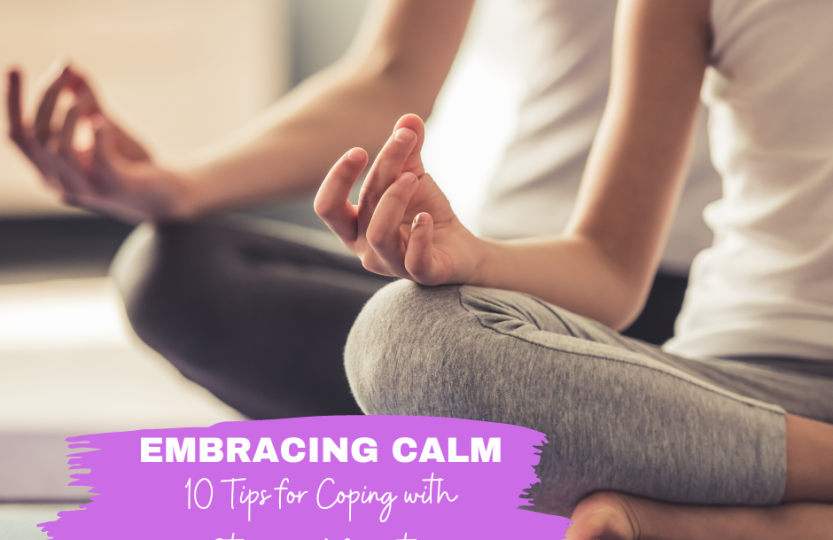In today’s fast-paced world, stress and anxiety have become common companions for many of us. Whether it’s trauma related, work pressures, personal challenges, or global uncertainties, feeling overwhelmed can become a regular part of life. However, by incorporating certain practices and tools, we can learn to manage and reduce our stress levels effectively. Here are some tips to help you cope with stress and anxiety.
1. Practice Mindfulness and Meditation
Mindfulness and meditation are powerful tools for calming the mind and reducing stress. By focusing on the present moment and acknowledging your thoughts and feelings without judgment, you can gain a clearer perspective and reduce the intensity of your anxiety. There are many apps like Headspace and Calm to offer guided meditations that can help you get started!
2. Exercise Regularly
Physical activity is a natural stress reliever. Exercise releases endorphins, which are chemicals in the brain that act as natural painkillers and mood elevators. Whether it’s a brisk walk, a yoga session, or a high-intensity workout, find a form of exercise you enjoy and make it a regular part of your routine. I am not usually big into physical fitness but I have found that getting outside and taking a walk with Little B or doing some stretching during my Netflix time at night really helps!
3. Maintain a Healthy Diet
What you eat can affect how you feel. A diet rich in fruits, vegetables, lean proteins, and whole grains can boost your mood and energy levels. Avoid excessive caffeine (as much as you can) and sugar, which can exacerbate anxiety symptoms. Staying hydrated is also crucial for maintaining optimal brain function and reducing stress, I find it helps to carry a cute water bottle with me everywhere I go. I do not drink the recommended amount (yet) but I am a work in progress.
4. Get Adequate Sleep
Lack of sleep can significantly impact your mental health and it is really hard to keep up with tiny humans when you are sleep deprived! Aim for 7-9 hours of quality sleep, experts say that women actually need more sleep than men. I know it is difficult, I suffer from insomnia but try to establish a relaxing bedtime routine, avoid screens before bed, and create a comfortable sleeping environment to improve your sleep hygiene.
5. Connect with Others
Human connection is essential for emotional well-being. Spend time with friends and family, or seek support from a counselor or therapist if needed. Talking about your feelings with someone you trust can provide relief and a new perspective on your situation. I have benefitted so much from seeing my therapist regularly! Having a third party that has my best interests at heart but who is also going to challenge me has been a game changer in how I look at things.
6. Set Realistic Goals and Prioritize Tasks
Feeling overwhelmed often stems from having too much on your plate. Break down your tasks into manageable “bite sized” steps and prioritize them. Setting realistic goals and celebrating small achievements can boost your confidence and reduce stress leading to more productive habits and less burnout!
7. Learn to Say No
It is important to recognize your limits and not overcommit. Saying no to additional responsibilities or situations that you know are going to be overwhelming when you are already feeling overextended can help prevent burnout. Remember, it is okay to prioritize your well-being! Boundaries can be so difficult to put into place. In my experience it was very frustrating initially, because I received some push back. Since putting them in place (and holding my ground) I have found that I am so much calmer and I have confidence in how I am going to respond if those boundaries are pushed.
8. Engage in Activities You Enjoy
Make time for hobbies and activities that bring you joy. Whether it is reading, gardening (aka dirt therapy), painting, or playing an instrument, engaging in something you love can be a great way to relax and de-stress. If you are a single mom, this can be especially difficult. As a single mom I try to maintain firm nap times and bedtimes for my little so that I can count on having a few hours a day to have a re-set. Not only is Little B happier when she gets an adequate amount of sleep but I am a calmer mama when I have a few moments to myself.
9. Practice Deep Breathing and Relaxation Techniques
Deep breathing exercises and techniques such as progressive muscle relaxation can help reduce physical tension and promote relaxation. Try deep breathing exercises by inhaling slowly through your nose, holding your breath for a few seconds, and then exhaling slowly through your mouth. I use these techniques to wind down before bed and at times of high stress. I have an app that walks me through this including positive affirmations along the way.
10. Limit Exposure to Stressors
While it’s impossible to avoid all stress, you can limit your exposure to certain stressors. For example, reduce your intake of news if it makes you anxious, or set boundaries with people who drain your energy. This can be especially hard if the stressors are close family or friends, if that’s the case appropriately limit your time and work on enforcing boundaries!
Final Thoughts
Coping with stress and anxiety is an ongoing process that requires patience and self-compassion and a wise mind. By incorporating these tips into your daily life, you can build resilience and create a more balanced, peaceful state of mind. Remember, it’s okay to seek help and take the time you need to care for yourself. Embrace the journey towards a calmer, more centered you!

